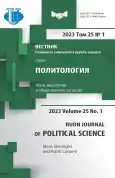Xi Jinping’s “The Great Rejuvenation of the Chinese Nation - Chinese Dream” as an Ideological Basis for the National Security of China
- Autores: Abdrakhimov L.G.1
-
Afiliações:
- People’s Friendship University of Russia
- Edição: Volume 25, Nº 1 (2023): Ideas, Ideologies and Public Consent
- Páginas: 189-203
- Seção: IDEAS AND IDEOLOGIES IN THE INTERNATIONAL CONTEXT
- URL: https://journal-vniispk.ru/2313-1438/article/view/322252
- DOI: https://doi.org/10.22363/2313-1438-2023-25-1-189-203
- ID: 322252
Citar
Texto integral
Resumo
The turn of Russia’s foreign policy vector to the East stimulates the better understanding of political processes and phenomena in China, which have not yet been sufficiently considered in Russian academia and political elites. Unlike the lack of a clear value-ideological basis of the national security system in Russia, China has solved this problem by including a conceptual level in the system of national security, with the concept of “The Great Rejuvenation of the Chinese Nation - Chinese Dream” at its center. This concept, developed by Xi Jinping, involves renewing the ideological foundations of China, especially the Communist Party, as the backbone of the entire state. This concept, as is customary in Chinese culture, does not negate the previous ones, but only expands and complements all the previous concepts formulated by the country’s past leaders: “Great Leap Forward”, “Reforms and Openness”, etc. The purpose of the study is to reveal the concept of “The Great Rejuvenation of the Chinese Nation - Chinese Dream” as the ideological basis of China’s national security. The methods of analysis of normative documents and discourse analysis of the Chinese leader’s speeches were applied to reveal the traditional cultural values of Chinese civilization with Confucian and Legist bias are in the center of the idea of the “Great Rejuvenation of the Chinese Nation - Chinese Dream”. This concept was examined in our study through the prism of national security theory, which acquired an updated structure consisting of levels: conceptual, sectoral (spheres), institutional (forces) and resource (means). We conclude that this concept applies to all spheres of China’s national security system and is the ideological basis of this system, predetermining the paradigm of China’s development.
Sobre autores
Leonid Abdrakhimov
People’s Friendship University of Russia
Autor responsável pela correspondência
Email: van.leonid@mail.ru
ORCID ID: 0000-0001-7703-5218
Postgraduate of the Comparative Political Science Department
Moscow, Russian FederationBibliografia
- Callahan, W.A. (2015). Identity and Security in China: The Negative Soft Power of the China Dream. Politics, 35(3–4), 216–229. https://doi.org/10.1111/1467-9256.12088
- Grachikov, E.N. (2019). Formation of the Chinese School of International Relations: Analytical Approaches and Research Methods. Vestnik RUDN. International Relations, 19(2), 187—200. (In Russian) http://doi.org/10.22363/2313-0660-2019-19-2-187-200.
- Gurov, D.V. (2019). “Chinese Dream” of Xi Jinping: theory and practice. Young Scientist, (25), 386–389. (In Russian)
- Irkhin, Yu.V. (2013). Confucian values, genesis, management and potential of China in the 21st century. Socio-humanitarian knowledge, (2), 116–134. (In Russian)
- Kondrashova, L.I. (2014). Chinese dream of national revival. Moscow: Institute of Economics of the Russian Academy of Sciences. (In Russian)
- Krushinsky, A.A. (2015). “Chinese Dream” and categories of traditional Chinese thought. Problems of the Far East, (5), 135–148. (In Russian)
- Lomanov, A.V. (2017). New concepts of Chinese foreign policy. Asia and Africa Today, (12), 8–18. (In Russian)
- Lomanov, A.В. (2014). “The Chinese Dream as an ideological symbol of the leadership of Xi Jinping. People’s Republic of China: Politics, Economics, Culture: To the 65th Anniversary of China. Moscow: Publishing house “Forum”, 40–56. (In Russian)
- Lukin, A. (2010). “The Chinese Dream and the Future of Russia. Russia in Global Politics, 8, (2), 90–101. (In Russian)
- Meng, Yu. (2021). “Socialism with Chinese specificity” in the era of Xi Jinping: on conceptual innovations in China’s official political discourse. State and Municipal Administration. Scientific Notes, (2), 270–277. (In Russian). https://doi.org/10.22394/2079-1690-2021-1-270-277
- Michael, A.P. (2017). The Chinese Dream: Xi Jinping thought on Socialism with Chinese characteristics for a new era. Educational Philosophy and Theory, 49(14), 1299–1304 https://doi.org/10.1080/00131857.2017.1407578
- Novoseltsev, S.V. (2016). The concept of “Chinese Dream” and its practical application. Comparative Politics, 7(1), 5–21. (In Russian). https://doi.org/10.18611/2221-3279-2016-7-1(22)-5-21
- Peter, F. (2016). Westward ho — the China dream and ‘one belt, one road’: Chinese foreign policy under Xi Jinping. International Affairs, 92(4), 941–957. https://doi.org/10.1111/1468-2346.12660
- Podshibyakina, T.A. (2020). “Golden Shield” of China: policy of managing mnemonic Internet practices. RUDN Journal of Political Science, 22(2), 194–204. (In Russian). https://doi.org/10.22363/2313-1438-2020-22-2-194-204
- Skripkar, M.V. (2015). Formation of the “Chinese Dream” concept: from Sun Yatsen to Xi Jinping. International Journal of Applied and Fundamental Research, (8–2), 394–397. (In Russian)
- Zhang, S., Guo, J., & Gaoyan Q. (2020). Development of National School of Political Science in China. World Economy and International Relations, 64(11), 84–95. (In Russian). https://doi.org/10.20542/0131-2227-2020-64-11-84-95
- Zhou, S. (2021). “Network” imagery in Chinese political discourse (on the material of speeches of President of China Xi Jinping). The world of Russian-speaking countries, 1(7), 5–16. (In Russian). https://doi.org/10.20323/2658-7866-2021-1-7-5-16
Arquivos suplementares









